| |||||||||||||||||||||||||||||||||||||||||||||||||||||||||||||||||||||||||||||
All 493 seats in the Reichstag 247 seats needed for a majority | |||||||||||||||||||||||||||||||||||||||||||||||||||||||||||||||||||||||||||||
|---|---|---|---|---|---|---|---|---|---|---|---|---|---|---|---|---|---|---|---|---|---|---|---|---|---|---|---|---|---|---|---|---|---|---|---|---|---|---|---|---|---|---|---|---|---|---|---|---|---|---|---|---|---|---|---|---|---|---|---|---|---|---|---|---|---|---|---|---|---|---|---|---|---|---|---|---|---|
| Registered | 38,987,324 ( | ||||||||||||||||||||||||||||||||||||||||||||||||||||||||||||||||||||||||||||
| Turnout | 78.8% ( | ||||||||||||||||||||||||||||||||||||||||||||||||||||||||||||||||||||||||||||
| |||||||||||||||||||||||||||||||||||||||||||||||||||||||||||||||||||||||||||||
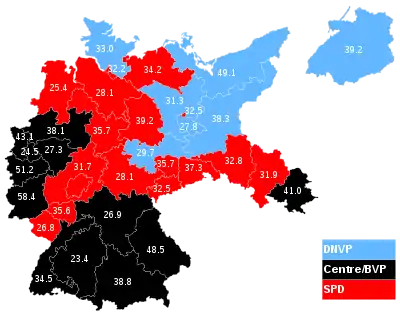
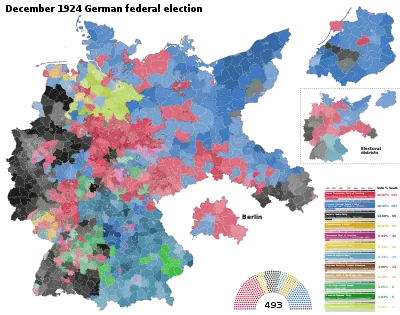
| |||||||||||||||||||||||||||||||||||||||||||||||||||||||||||||||||||||||||||||
| |||||||||||||||||||||||||||||||||||||||||||||||||||||||||||||||||||||||||||||
| This article is part of a series on the |
| Politics of Germany |
|---|
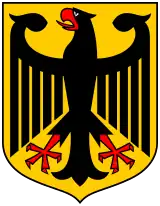 |
Snap federal elections were held in Germany on 7 December 1924,[1][2] the second that year after the Reichstag had been dissolved on 20 October. The Social Democratic Party remained the largest party in the Reichstag, receiving an increased share of the vote and winning 131 of the 493 seats.[3] Voter turnout was 78.8%.[4]
Campaign
The National Socialist Freedom Movement received 6.5% in the previous election, but party unity broke down afterwards. Julius Streicher and Hermann Esser left to form their own party while Adalbert Volck and Ludolf Haase advocated abstaining from the election or voting for other nationalist parties.[5] The NSFM was attacked as anti-Catholic by the Centre Party and anti-Christian by the German National People's Party (DNVP).[6]
Catholics accounted for 17% of NSFM's vote.[7]
Results
| Party | Votes | % | +/– | Seats | +/– | |
|---|---|---|---|---|---|---|
| Social Democratic Party | 7,881,041 | 26.02 | +5.50 | 131 | +31 | |
| German National People's Party | 6,205,802 | 20.49 | +1.04 | 103 | +8 | |
| Centre Party | 4,118,849 | 13.60 | +0.23 | 69 | +4 | |
| German People's Party | 3,049,064 | 10.07 | +0.87 | 51 | +6 | |
| Communist Party of Germany | 2,709,086 | 8.94 | −3.67 | 45 | −17 | |
| German Democratic Party | 1,919,829 | 6.34 | +0.69 | 32 | +4 | |
| Bavarian People's Party | 1,134,035 | 3.74 | +0.51 | 19 | +3 | |
| National Socialist Freedom Movement | 907,242 | 3.00 | −3.55 | 14 | −18 | |
| Economic Party of the German Middle Class | 692,963 | 2.29 | +0.58 | 12 | +5 | |
| Agricultural League | 500,525 | 1.65 | −0.31 | 8 | −2 | |
| Bavarian Peasant's and Middle Class Party | 312,442 | 1.03 | +0.37 | 5 | +2 | |
| German-Hanoverian Party | 261,549 | 0.86 | −0.23 | 4 | −1 | |
| German Social Party–Reichsbund für Aufwertung | 159,115 | 0.53 | −0.61 | 0 | −4 | |
| Independent Social Democratic Party | 98,842 | 0.33 | −0.47 | 0 | 0 | |
| German Revaluation and Reconstruction Party | 81,944 | 0.27 | New | 0 | New | |
| Polish People's Party | 81,700 | 0.27 | −0.07 | 0 | 0 | |
| Christian Social People's Community | 41,530 | 0.14 | −0.29 | 0 | 0 | |
| Free Economy Union F.F.F. | 38,923 | 0.13 | +0.01 | 0 | 0 | |
| Revaluation and Reconstruction Party (RWV 23) | 33,656 | 0.11 | New | 0 | New | |
| Party for People's Welfare | 32,496 | 0.11 | New | 0 | New | |
| Haeusser Alliance | 9,747 | 0.03 | −0.05 | 0 | 0 | |
| Wendish People's Party | 5,585 | 0.02 | −0.02 | 0 | 0 | |
| Schleswig Club | 5,134 | 0.02 | −0.01 | 0 | 0 | |
| German Christian People's Party | 4,322 | 0.01 | New | 0 | New | |
| Deutschvölkische Reichspartei | 3,405 | 0.01 | New | 0 | New | |
| Masurian Union | 542 | 0.00 | 0.00 | 0 | 0 | |
| Reevaluation and Reconstruction Party | 478 | 0.00 | New | 0 | New | |
| Tenants' Party | 246 | 0.00 | New | 0 | New | |
| Total | 30,290,092 | 100.00 | – | 493 | +21 | |
| Valid votes | 30,290,092 | 98.65 | ||||
| Invalid/blank votes | 414,934 | 1.35 | ||||
| Total votes | 30,705,026 | 100.00 | ||||
| Registered voters/turnout | 38,987,324 | 78.76 | ||||
| Source: Gonschior.de | ||||||
References
- ↑ Dieter Nohlen & Philip Stöver (2010) Elections in Europe: A data handbook, p762 ISBN 978-3-8329-5609-7
- ↑ Graper, Elmer D. (1925). "The Reichstag Elections". American Political Science Review. 19 (2): 362–370. doi:10.2307/2938928. ISSN 0003-0554. JSTOR 2938928. S2CID 147108053.
- ↑ Nohlen & Stöver, p790
- ↑ Nohlen & Stöver, p777
- ↑ Childers 1983, p. 58-61.
- ↑ Childers 1983, p. 114-115.
- ↑ Childers 1983, p. 112-113.
Works cited
- Childers, Thomas (1983). The Nazi Voter: The Social Foundations of Fascism in Germany, 1919-1933. University of North Carolina Press. ISBN 0807815705.
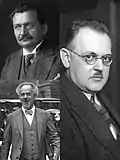
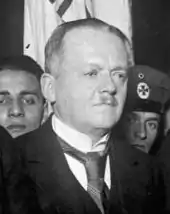
.jpg.webp)
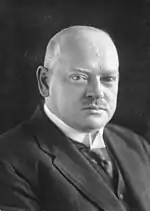

.jpg.webp)